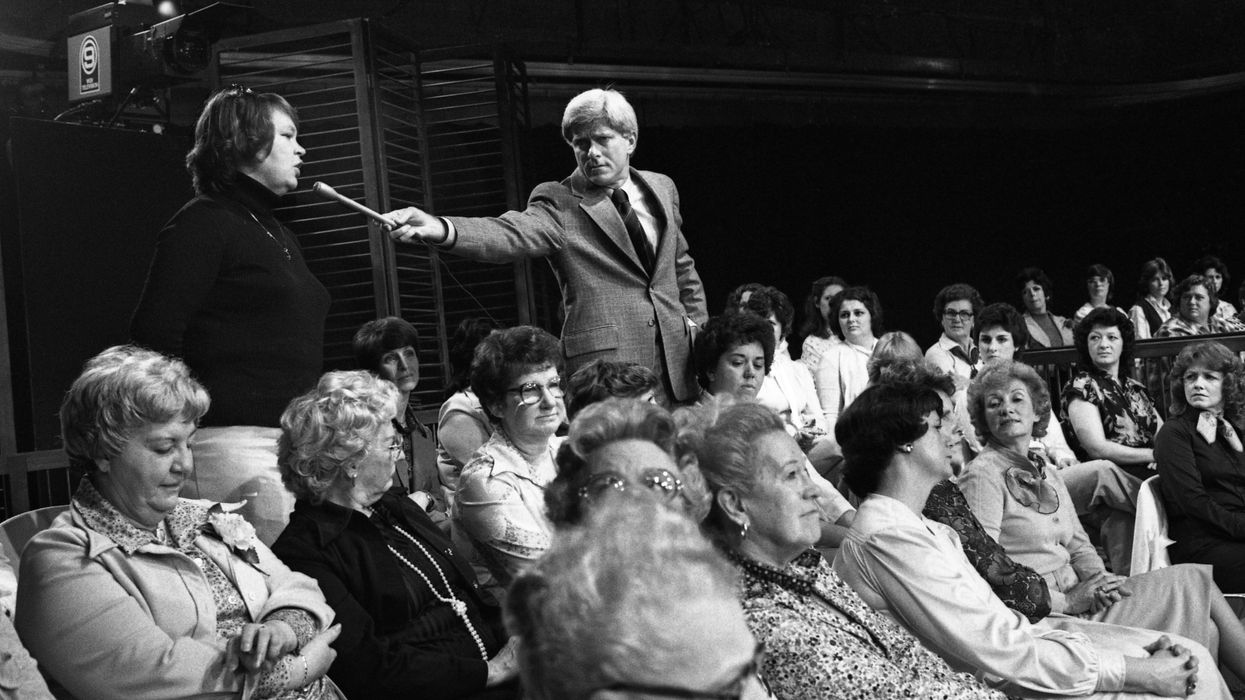Daley-Harris is the author of “ Reclaiming Our Democracy: Every Citizen’s Guide to Transformational Advocacy ” and the founder of RESULTS and Civic Courage. This is part of a series focused on better understanding transformational advocacy: citizens awakening to their power.
A recent tribute to television talk show icon Phil Donahue included the bit of insight that led him to innovate the traditional TV interview format: “I realized during the commercials that these people in the audience were asking better questions than I was.”
I too discovered the genius of ordinary people speaking from their hearts when I was developing the grassroots citizen advocacy group RESULTS more than 40 years ago. Again and again I listened to the silence in the room as people wrote their first letter to a member of Congress and then heard the passion and poetry as some of the letters were read aloud.
If the voices of ordinary people — whether in an audience or a room of grassroots advocates — can be more powerful than the “professionals,” why don’t we provide the structure of support that allows for that brilliance to be heard more often?
Instead, organizations offer email form letters to sign. You know, “Give me your name and Zip code and we’ll send the letter for you.” No brilliance there. “We offer online petitions to sign.” Again, no brilliance. But train and support ordinary people to transform into powerful advocates? Unbelievable brilliance there. And don’t just take my word for it.
Recently, I interviewed grassroots activists from organizations that work to deliver transformational advocacy to their members.
Lisa Jordan, an associate teaching professor at Drew University, joined her local chapter of the Friends Committee on National Legislation during Covid. After numerous Zoom meetings with congressional offices, she went to D.C. for the first time. “That was a total thrill,” she told me.
They delivered a statement of consensus for peace in Palestine and lobbied for peace-building funds. “It was the most fun,” Jordan continued. “This work is the best medicine for when you’re feeling hopeless or have sleepless nights. It’s the best way to avoid despair. It’s medicine for me.”
Carol Olivieri wasn’t looking for a group to join when a friend invited her to an introductory call for a Catholic Relief Services chapter that some people wanted to launch in her area. When she joined, she admitted that the advocacy piece wasn’t something she was excited about.
“It was really intimidating to me,” she said. “I’m a regular person, not really political … [but] this is where CRS empowers you with the materials, videos and training they provide.”
Olivieri was especially empowered by the monthly webinars and the grassroots victory section where volunteers around the country would talk about congressional meetings they’d had. One described a meeting with an aide to Sen. Ted Cruz (R-Texas). “I was really encouraged by that,” Olivieri said. “They explained how they did it and how many times they had to reach out to the office to make it happen. The grassroots victories were very encouraging.”
Olivieri decided to write a letter to the editor, which she said “was really challenging because it’s putting yourself out there in your community. But these are things that people need to be informed about. I thought, okay if I can write this LTE and someone understands the issue then it’s worth it. … I’m not a writer. I’m a nurse and a nurse educator but that required me to do a lot of writing. I’d written an LTE 15 years before, but not again until now. ….”
“When I hit send I was thinking ‘I hope I did it right. I hope I didn’t make a mistake. I hope it’s clear,’” she said. “It was a great victory when I saw it in print. … Three [have been published so far in] the Trenton Times. … I thought, ‘Okay, I’m doing something right.’”
We need the volunteers from more nonprofits saying, because of the training and coaching they’re receiving, “Okay, I’m doing something right.” We need more volunteer advocates to look at what they’re receiving from their organization and saying: “This work is the best medicine for when you’re feeling hopeless or have sleepless nights. It’s the best way to avoid despair.”
We need more nonprofits to hear the wisdom in Phil Donahue’s insight — “people in the audience were asking better questions than I was” — and feel the same way about their own members.




















